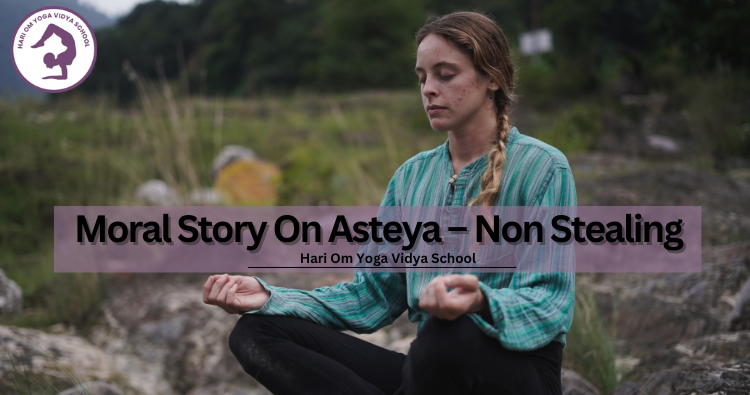Introduction – Understanding Asteya in Yoga and Life
Asteya is one of the foundational Yamas in the yogic path, and it’s far more than just the idea of “not stealing.” At its core, Asteya means respecting what belongs to others, not just possessions, but time, attention, space, ideas, and emotional energy. In a world where competition and comparison often make us feel we’re lacking something, Asteya reminds us to live with fullness and gratitude.
In the ancient yogic texts, Asteya is seen as a gateway to trust and harmony, not just with others, but with ourselves. The absence of Asteya isn’t always criminal; it shows up in small everyday ways. Borrowing someone’s ideas without giving credit, taking more than our share of attention, or expecting others to bend to our convenience, these are subtle violations of this principle.
At Hari Om Yoga Vidya School, Asteya isn’t just discussed in theory, it’s practiced in how we share space, support each other, and honor the individual journeys of every student. Our approach to teaching yoga always includes the ethical wisdom that allows your growth to be as spiritual as it is physical.
Read More: Why Is Kundalini Yoga Dangerous? The Truth About Its Risks and Rewards
Asteya Meaning in Hindi and the Broader Yogic Context
In Hindi, Asteya means “चोरी न करना”, which directly translates to “not stealing.” But in the yogic context, this principle runs deeper than material theft. It’s about not desiring or taking anything that hasn’t been freely given, whether it’s credit for someone else’s work, affection from a person who hasn’t offered it, or even forcing attention when it isn’t available.
The meaning of Asteya expands further when you understand it alongside the other Yamas, like Ahimsa (non-violence) and Satya (truth). Together, they create a framework of conscious living. Asteya teaches that inner contentment and self-worth reduce the urge to take more than what is necessary.
When we practice Asteya daily, we train ourselves to recognize abundance instead of lack. In that mindset, we no longer feel the need to steal, not time, not energy, not resources. Instead, we become more generous and peaceful within.
A Moral Story on Asteya – The Gardener and the Seeds
There once lived a humble gardener named Dev who longed to make his garden the most beautiful in the entire kingdom. One day, he came across rare, exotic seeds in the royal nursery. Temptation took over, and he secretly took a handful, thinking no one would notice. Soon, flowers bloomed unlike anything the villagers had ever seen. His garden gained fame, but Dev couldn’t enjoy his success.
He started feeling restless and guilty. The joy that should have come from his creation was shadowed by the knowledge that it wasn’t fully his. The flowers began to wilt, and no matter what he did, the garden lost its luster.
The Realization – What the Gardener Learns About Non-Stealing
Unable to bear the guilt any longer, Dev returned to the royal nursery and confessed. Instead of punishment, the royal gardener smiled and handed him a fresh batch of the same seeds, freely given this time. Dev returned home, replanted them, and this time, the garden bloomed with genuine beauty and joy.
This story illustrates the subtle power of Asteya. Even when the world may praise us for what we’ve taken, our inner self knows the truth. Real joy arises not from what we possess, but from what we earn and receive with integrity.
Asteya on the Mat – Ethical Awareness in Physical Practice
Asteya doesn’t just apply to everyday life, it lives in your yoga practice too. When you show up on the mat, do you listen to your body or push yourself to “keep up” with others? When you teach, do you honor the source of the knowledge you pass on, or do you claim it all as your own?
Taking inspiration is natural, but Asteya reminds us to always give credit where it’s due. Practicing non-stealing on the mat means respecting your own limits, not judging yourself harshly, and holding space for others to learn at their own pace. It’s about showing up with humility, honesty, and awareness.
At Hari Om Yoga Vidya School, this practice is gently instilled in students, so yoga becomes not just a series of movements, but a life lived in harmony with truth and respect.
Questions to Ask Yourself – Are You Practicing Asteya in Everyday Life?
Asteya begins with awareness. Ask yourself, am I taking someone’s time without permission? Do I interrupt others to be heard? Do I take emotional energy from people without offering the same in return? Do I use someone’s ideas, style, or words without acknowledgment?
When we live unconsciously, it’s easy to slip into small acts of taking. But when we pause and reflect, we gain the power to choose differently. Asteya invites us to live more mindfully, where giving and receiving are both honored as sacred.
Read More: Everything You Need to Know About Kundalini Yoga Teacher Training
Why Asteya Matters in the Path of Yoga
Yoga isn’t just about flexibility, it’s about integrity. Practicing Asteya clears emotional clutter and builds spiritual strength. It trains us to trust life and ourselves, reducing envy, comparison, and competition.
When you practice non-stealing, you align with truth. You feel less burdened by guilt or insecurity. Your relationships improve. You sleep better. You walk lighter. In short, Asteya is the quiet key to inner freedom.
This is why all traditional yoga schools, including Hari Om Yoga Vidya School, teach the Yamas as essential foundations, not as optional ideas, but as vital practices to embody the true spirit of yoga.
Conclusion – Live with Integrity, Practice with Heart
Asteya teaches that the most beautiful things in life cannot be taken, they must be earned, shared, or received with grace. Whether it’s love, knowledge, trust, or recognition, when they come from a space of honesty, they carry true power.
In a world of shortcuts and self-promotion, practicing Asteya is a radical act. It’s a return to your deeper self. It helps you walk this life not as someone who collects, but as someone who contributes, with heart, with honor, and with peace.
When you step into a yoga class at Hari Om Yoga Vidya School, you don’t just learn how to move, you learn how to live. Asteya is not just a concept we teach; it’s a value we breathe into every session, every story, and every silence.
Deepen Your Yoga Practice with Hari Om Yoga Vidya School
Located in the heart of Rishikesh, Hari Om Yoga Vidya School is a place where ancient yogic wisdom meets modern teaching techniques. As a top yoga school in Rishikesh, we are committed to providing authentic, immersive yoga education in a peaceful, spiritual setting. Recognized as one of the best yoga schools in Rishikesh, we offer structured training programs designed to help you evolve in your practice, whether you are a beginner or an experienced yogi.
If you’re searching for a yoga school in Rishikesh that focuses on holistic learning, experienced teachers, and a supportive community, look no further!
Explore Our Yoga Teacher Training & Retreats
At Hari Om Yoga Vidya School, we offer a range of courses tailored for different levels of practitioners:
✅ 100-Hour Yoga Teacher Training in Rishikesh – A foundational course for those looking to begin their yoga journey.
✅ 200-Hour Yoga Teacher Training in Rishikesh – An internationally recognized certification for aspiring yoga teachers.
✅ 300-Hour Yoga Teacher Training in Rishikesh – Advanced training to deepen your practice and refine your teaching skills.
✅ 7-Day Yoga Retreat in Rishikesh – A rejuvenating escape into yoga, meditation, and self-discovery.
✅ 10-Day Yoga Retreats in Rishikesh – A transformative experience that blends yoga, relaxation, and Himalayan serenity.
Join us for a life-changing experience and become part of our global yoga family! 🌿✨





